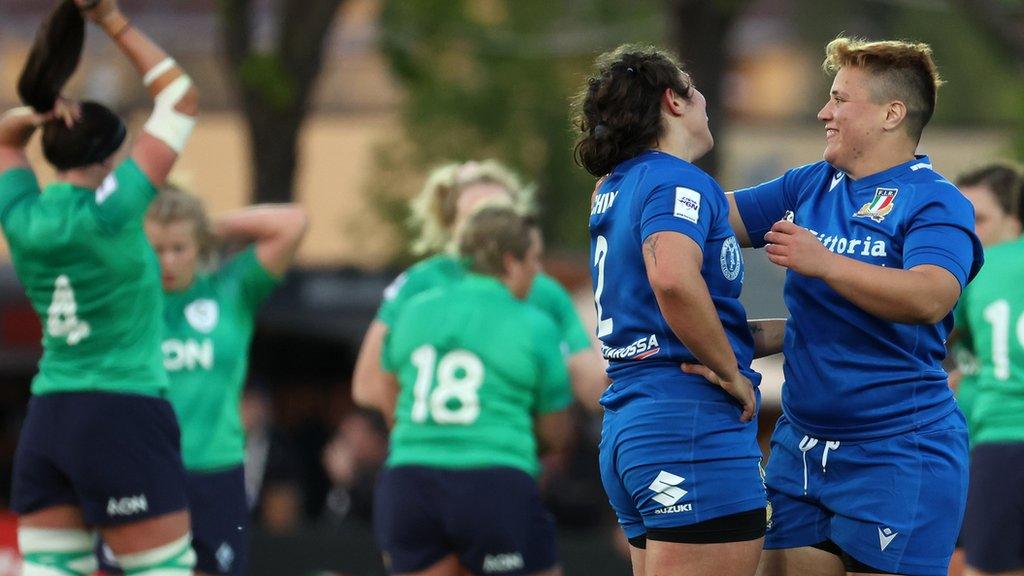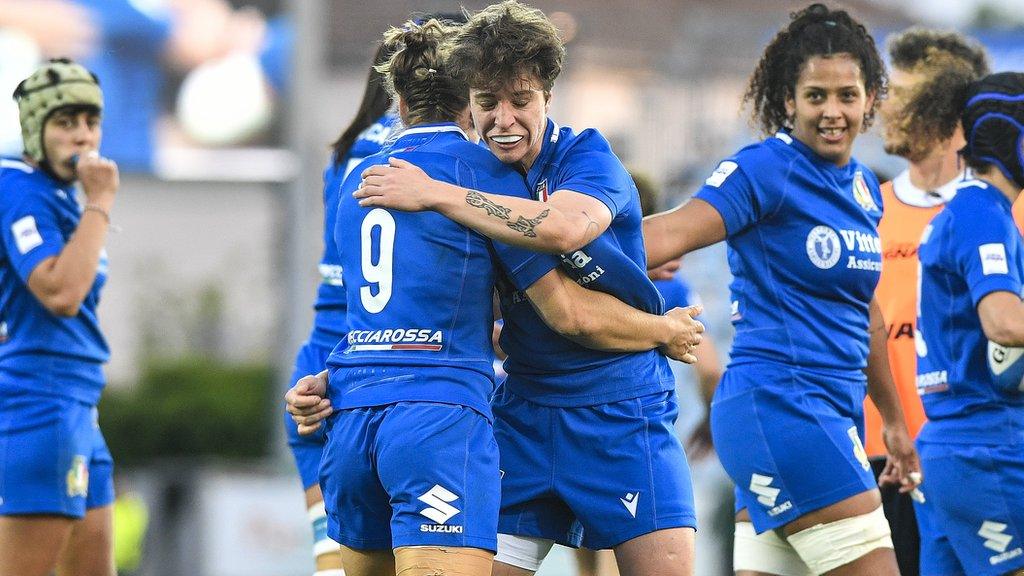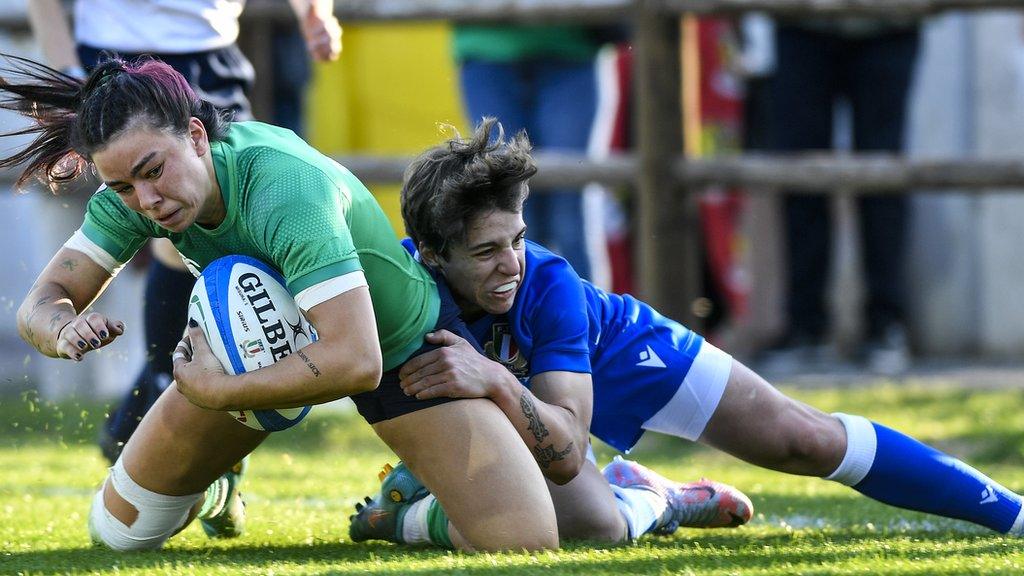Ciara Griffin column: Ireland's youth provide hope through the gloom
- Published

Ireland had targeted the Italy game as a must-win but Saturday was yet another tough day in the toughest of seasons for the Irish women.
I'll talk more about the match (if we must) later, and a recent newspaper article which raised concerns about the IRFU.
But let's start with the uplifting news.
Because believe it or not, something really positive is happening for women's rugby in Ireland.
For 10 years we have been asking for an under-age national side and now we finally have an under-18 side that is being invested in and shown how to perform at international level.
They have played some great rugby at the Under-18 Six Nations Women's Festival blitz, beating Italy and Scotland, and are getting exposure to what international rugby and high-performance sport is all about.
Head coach Larissa Muldoon is a good mentor and has high standards. These players have top-class coaches who have great rugby knowledge to call upon and in five, 10 years who knows what they could achieve?
They are the future, because even though the IRFU is investing in the senior game now, six months isn't going to make up for 10 years of under-investment.
It will take time but the public are behind the playing group, they are behind the players, and they will stay with them.
Italy defeat a new low

Italy beat Ireland 24-7 in Parma at the weekend
When you focus on the negatives all the time it is so draining, but you'd have to say Saturday's game was a real low point.
Both teams had a lot of unforced errors and in the first 25 minutes both were cagey and nervous because there was a lot of pressure on both sides to get a result.
Italy settled better and controlled the phases better. They kept hold of the ball better while Ireland had plenty of possession but the last piece of the puzzle, the last pass, let them down and they couldn't execute. Italy executed their chances.
Ireland were in the Italy '22' lots of times and inside the 5m line multiple times, but it was a turnover, a missed pass, a handling error, that let them down.
It was frustrating for the players.
The one try they got was a penalty try, and it's not enough. You need to execute in the green zone, as we call it. You must come away with points.
I've been there myself. There's nothing worse when you're building phases, and there's a turnover at the breakdown.

Italy celebrate after their first win of this Six Nations campaign
Nothing wipes your energy more because you're trying to get that go-forward ball and a split second later you're turned and chasing again. It's much easier to play with the ball than without out.
Italy's tries were well-worked, but again Ireland's missed tackle count was very poor and it is becoming a common theme now.
They missed 69 in the first two games (43 against France, 26 against Wales) alone. When you're defending your hips have to be square to make a dominant tackle.
Ireland are always doing a shuffle defence and scrambling when they should be square. They are set up in time, but the body positioning is wrong, so it's a passive defence at times.
Bad timing
The article in the Telegraph last week was unfortunate timing before a big game.
In an international week the roof could be falling down in the High Performance Centre and they shouldn't notice. They should be solely focused on the game.
On the content of the piece, I sincerely hope that the player or players in question who allegedly weren't told they weren't selected or dropped or whatever, are the last players to suffer this.
It's not nice to find out that way.
There should be a clear policy in place, because if you have a poor selection policy it creates tension and it's an unnecessary distraction.
Coaches have their say but it's a professional set-up now so players should have an input. Just be clear - put a team sheet on the board and agree that in advance with players and so on.

Ireland's Natasja Behan is tackled by Alyssa D’Incà in Italy
Ireland head coach Greg McWilliams came out in response to the article and denied that the IRFU is sexist, and that is a big statement to make.
You need to be 100% sure before you make a statement like that. You need to have all the facts.
It was a big statement to be made in the first place, but any statement you make either way needs to be evidence-based.
I can't say from my experience whether it is or isn't accurate. We were lucky we had very good coaches who were supportive and fought for us.
That's not to say there weren't things we would have loved to have changed - that letter (from 62 current and former players in 2021) wouldn't have been written and sent to the Irish government unless we wanted the IRFU to make changes.
If the powers above don't give you support, it's hard to get the outcome you want.
No-one doubts the players, and if another player speaks out, it is through passion.
It is not about getting more money, it's about setting standards that need to be set, about structures, about pathways from a club shirt into a green jersey.
Damage limitation
The England game this Saturday is just about damage control.
Ireland won't be able to impose their own style of play against England because England have the fastest breakdown in the Six Nations.
Wales had a good opening half and had a go, but Ireland must focus on slowing down England's attacking ball.
The breakdown starts with a dominant tackle - so if you're not making the tackles, you can't slow down the breakdown.
I hope they take in 10, 20-minute intervals of just blasting everything and then resetting and going again.
No matter what happens, just remember the Ireland Under-18s and trust that, in years to come, they will have the collective might to tackle England.